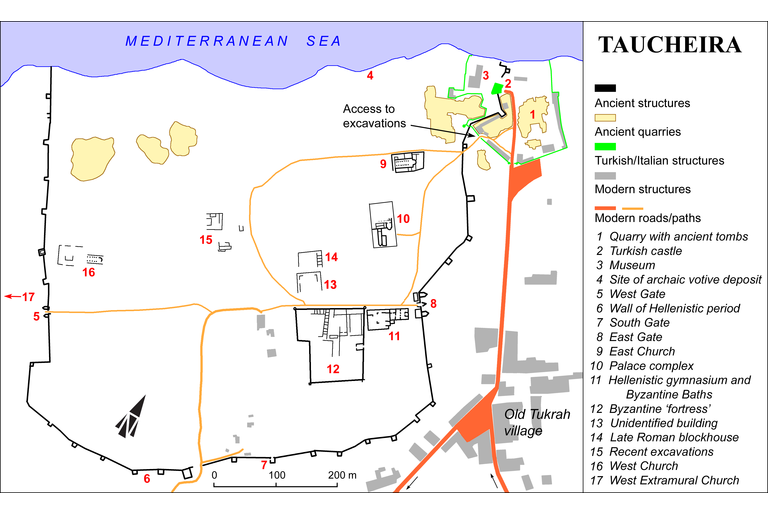Epitaph of Lo[ukianos?]
GVCyr020
Trismegistos ID: 738913
Source Description
Support
Block of sandstone; broken away at both right corners and at upper rim at right (1.10; 0.60;0.36).
Layout
Inscribed on the oblong face in four lines, the last one being nearly completely erased.
Letters
0.065; letters cut so close to one another that they are often in contact; broken-bar alpha, diamond-shaped theta and omicron, square sigma.
Place of Origin
Taucheira pleiades; HGL , presumably from the Necropolis .
Date
Probably second century A.D. (lettering)
Findspot
Found before 1935 at Taucheira pleiades; HGL , in the old Turkish village, re-used in the precinct-wall of the old and already derelict Zawia.
Present Location
Never found since first publication.
Text constituted from
Transcription from previous editors.
Bibliography
Oliverio, 1933-1936 Oliverio, G., 1933-1936, Documenti antichi dell'Africa Italiana, II, fasc. 1-2, Bergamo - see in bibliography , pp. 238-239, n. 471 and fig. 54, whence SEG Supplementum Epigraphicum Graecum, Leiden, then Amsterdam, 1923-1971, then 1979- - see in bibliography , 9.558; Peek, 1955 Peek, W., 1955, Griechische Vers-Inschriften, I-II, Berlin - see in bibliography , n. 398; Peek, 1972 Peek, W., 1972, Griechische Versinschriften aus der Cyrenaica aus Mauretanien und Numidien, Abhandlungen der sächsichen Akademie der Wissenschaften zu Leipzig, phil.-hist. Klasse, 63.4, Berlin - see in bibliography , n. 12.
Text
Apparatus
1
Peek, 1972
Peek, W., 1972, Griechische Versinschriften aus der Cyrenaica aus Mauretanien und Numidien, Abhandlungen der sächsichen Akademie der Wissenschaften zu Leipzig, phil.-hist. Klasse, 63.4, Berlin - see in bibliography
Λου̣[κιανὸς] : Oliverio, 1933-1936
Oliverio, G., 1933-1936, Documenti antichi dell'Africa Italiana, II, fasc. 1-2, Bergamo - see in bibliography
, Peek, 1955
Peek, W., 1955, Griechische Vers-Inschriften, I-II, Berlin - see in bibliography
Ἀ̣θ̣[ην c. 14]
||
Peek, 1955
Peek, W., 1955, Griechische Vers-Inschriften, I-II, Berlin - see in bibliography
[κεῖται] : Oliverio, 1933-1936
Oliverio, G., 1933-1936, Documenti antichi dell'Africa Italiana, II, fasc. 1-2, Bergamo - see in bibliography
[---]
||
Oliverio, 1933-1936
Oliverio, G., 1933-1936, Documenti antichi dell'Africa Italiana, II, fasc. 1-2, Bergamo - see in bibliography
, Peek, 1955
Peek, W., 1955, Griechische Vers-Inschriften, I-II, Berlin - see in bibliography
[---] : Peek, 1972
Peek, W., 1972, Griechische Versinschriften aus der Cyrenaica aus Mauretanien und Numidien, Abhandlungen der sächsichen Akademie der Wissenschaften zu Leipzig, phil.-hist. Klasse, 63.4, Berlin - see in bibliography
[Λιβύης]
2-3
Peek, 1972
Peek, W., 1972, Griechische Versinschriften aus der Cyrenaica aus Mauretanien und Numidien, Abhandlungen der sächsichen Akademie der Wissenschaften zu Leipzig, phil.-hist. Klasse, 63.4, Berlin - see in bibliography
(vac. 2) ὃς πᾶν εὐ̣σ̣ε̣β̣[ίηι νεί]|κησ' : Oliverio, 1933-1936
Oliverio, G., 1933-1936, Documenti antichi dell'Africa Italiana, II, fasc. 1-2, Bergamo - see in bibliography
[..] Θ̣Ε̣Π̣[c. 8] |κῆς : Peek, 1955
Peek, W., 1955, Griechische Vers-Inschriften, I-II, Berlin - see in bibliography
[ὑπ]οσ̣τ̣[ὰς ἔργα δι]|κῆς ||
Peek, 1972
Peek, W., 1972, Griechische Versinschriften aus der Cyrenaica aus Mauretanien und Numidien, Abhandlungen der sächsichen Akademie der Wissenschaften zu Leipzig, phil.-hist. Klasse, 63.4, Berlin - see in bibliography
ἐν̣[ί τ'] ἔργο̣ι̣ς̣ : Oliverio, 1932-1933
Oliverio, G., 1932-1933, Documenti antichi dell'Africa Italiana, I, fasc. 1-2, Bergamo - see in bibliography
[κ]α̣ὶ̣ ̣ε̣ὐ̣ε̣ργεσί[ας]
French translation
Ici [repose] sous la terre Lo[ukianos?] [---] ,
qui l'emporta sur chacun par sa piété et en actes de vertu.
English translation
Here [lays] under the earth Lo[ukianos?] [---] ,
who prevailed over everyone through piety and in acts of valour.
Italian translation
Qui [giace] sotto terra Lo[ukianos?] [---] ,
che vinse su tutti per la pietà e le azioni virtuose.
Commentary
Line 1. The name Loukianos, proposed by Peek, is largely restored; however it seems a good guess, meeting the needs of both the rhythm and the two letters preserved at the beginning. As shown by Oliverio's photograph, the stone was already broken off at the time of the first edition so that the line was lost after Λο. Whatever its position, the verb κεῖται is a must. Conversely it seems hazardous to follow Peek's restoration for the word 'Libya' that would normally apply only to a foreigner dead in that region: for such a status we have no clue.
At line 2, πᾶν may be, as Peek supposes, a later form of the accusative masculine (so translated 'over everyone'); alternatively, if the traditional neuter, it might perhaps be understood as 'over everything'.
On the whole, Peek restorations at lines 1 and 2 exceed the length covered by line 3, which corresponds to the modern condition of the stone. As this has been reused, we may admit that it has been recut and that line 3 was not fully inscribed. Anyway, it seems difficult to fill two hexameters with only the preserved dimensions of the block. The 4th line being fully deleted (perhaps an epsilon about the middle), we cannot even know whether this was the continuation of a metrical text.
An ancient print of the photograph had been sent by J.M. Reynolds to W. Peek and is kept in the archive of Peek Nachlass at Berlin. We thank Kl. Hallof for providing an excellent digitized copy.
Metrical analysis: Peek's restoring two dactylic hexameters seems the best solution, as the remnant segments of verse-line 2 exclude a pentameter.
Creative Commons Attributions-NonCommercial 4.0 International License.
All citation, reuse or distribution of this work must contain a link back to DOI: http://doi.org/10.6092/UNIBO/IGCYRGVCYR and the filename (IGCyr000000 or GVCyr000), as well as the year of consultation.
